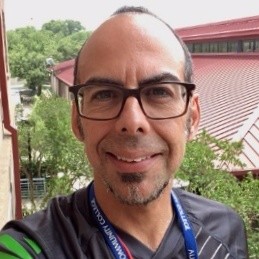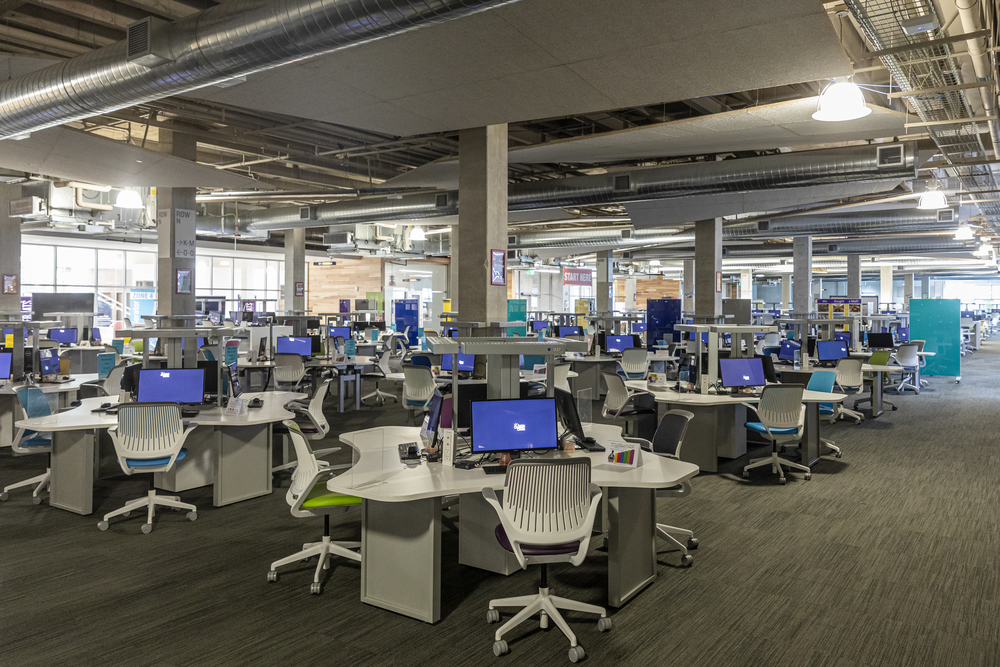By Dash Kostka
Joey Machado, a 60 year old staff member, always keeps two beautiful watercolor paintings hanging on the wall of his office at Austin Community College’s Rio Grande campus. They were created by his teenage son while he was recovering in the hospital last year from a biking accident. The paintings also serve as a positive reminder of how far his son, who recently found a new passion for photography, has come in his physical recovery. “[It] kind of brightens my day knowing that he has an artistic side,” Machado said.

As an educational technologist for the college, Machado is one of several dependable staff members across ACC’s 11 campuses who are vital to ensuring every classroom’s technology can operate over the course of every day, week, and semester. He says the vast majority of his work is to answer technical questions and fix various issues that may come up on a day-to-day basis. If a student can’t see their grades or if a program like Respondus Lockdown is malfunctioning, Machado is the one they call for help. Classes go by fast during the day, and faculty often doesn’t have time for any technology breakdowns, so Machado says that his office has a “hotline for faculty to get a hold of us.”
Unusually, Machado found his way into this line of work through studying music at a community college in San Antonio. Eventually his education led him toward transferring to the University of Texas – Machado made a point of putting up a “hook-’em-horns” when I asked him about his educational background –to study at the Moody College of Communications. After graduating from Texas with an emphasis in RTF production, Machado’s career took a winding path, including as an employee for the now-defunct Time Warner corporation. He finally landed at ACC eight years ago, and from my interaction with him, he seems to enjoy his job and his positive impact on students and faculty.

Machado’s role at ACC is not just limited to fixing snags in technology during the day – he is also intricately involved in educating faculty. Over the last ten years, and accelerating during the fallout of the COVID-19 pandemic, technology has played an ever-expanding role in fostering and transforming a modern college education. Out are the days of mountains of paper assignments, now education resources like online Learning Management Systems” (LMS) and virtual classes on Zoom are what’s in.
Every time that ACCintroduces new technologies or virtual systems to its classes, such as the introduction of Blackboard a few years ago, Machado says he is out on the front lines “endorsing and supporting” each platform and helping professors understand how they work.
Just this past fall, ACC introduced a new virtual-education software program called Panopto. The system allows students to produce and submit video assignments while also having a place for professors to post instructional videos as well.Machado saw that Panopto was implemented and understood by the faculty it serviced, helping lead the way for ACC’s push toward “Hyflex” instruction. Hyflex teaching allows for classes that have some students attending in-person, while other students attend virtually through Zoom.
Machado admits that the “greatest challenge” of ACC’s gradual march towards integrating technology in the classroom is that it is a “whole different environment,” and therefore has a “learning curve” for faculty who are unfamiliar with certain LMS programs like Blackboard or Canvas. “But once they make the leap, and they see the benefit, and how everything is easily integrated, then they’re sold on the product.”
As a man who has worked with technology his whole adult life, Machado believes that receiving a modern education in media and technology is very important in our ever-changing world. According to him, the work that students put in during their time in college by educating themselves in various aspects of digital platforms like cyber-security acts as a kind of “pre-job training for what’s out there.” He emphasizes that employers want to hire prospective employees who can transfer their knowledge from certain platforms to others.
Machado anticipates that as long as ACC continues to carve a path forward by integrating more technology into the classroom, his niche skill will continue to be vital across campus. Soon, he says, there will likely be a new digital platform that educational technologists like him will need to introduce to the faculty to make their jobs a little bit easier, and the value of an education at ACC a little bit better.


